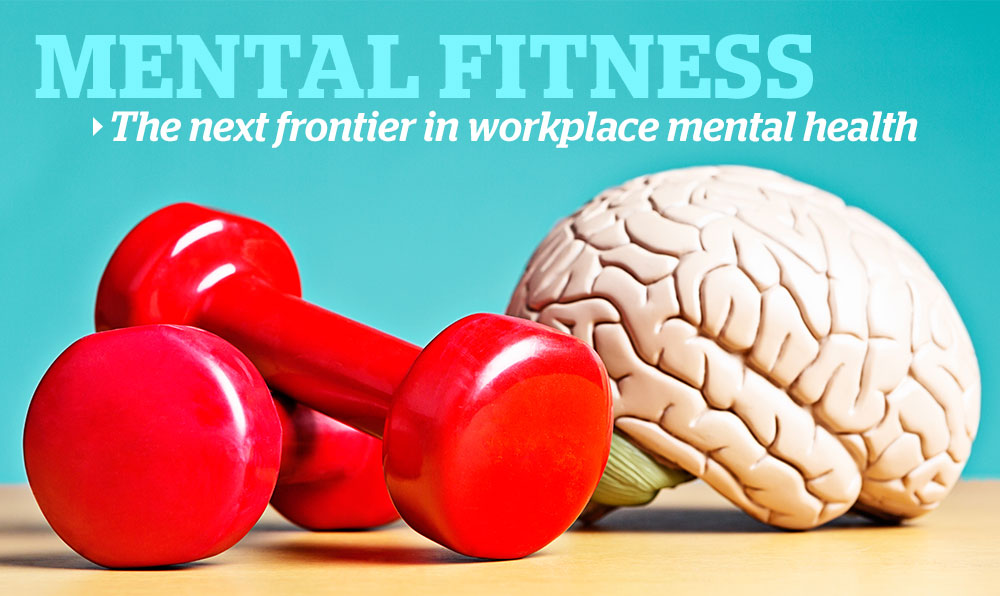

Columns/Blogs
Features
Features
Mental Health
PSWA
Why mental fitness feels hard when it’s actually not
By Bill Howatt

EDITOR’S NOTE: ‘Mental Fitness: The next frontier in workplace mental health’ is a monthly series, in partnership with Dr. Bill Howatt of Howatt HR Consulting in Ottawa. This series takes a deeper look at mental fitness — an approach to prevent mental harm and promote mental health.
“Thinking about mental fitness is much harder than doing it.” — Dr. Bill Howatt
Since the pandemic hit two years ago, I have been on a mental fitness journey that I have been sharing through my Dr. Bill Memos. When I started focusing on my mental fitness, I discovered that thinking about mental fitness is much harder than doing it.
Let me explain.
Pause and think about what’s on your to-do list, stressors, and family and work challenges. If you are like me, you will come up with many things you think you have to do, are behind on, or struggle to keep up with. When our attention and energy are outwardly focused, thinking about doing more triggers a surge of stress, pressure, or feeling overwhelmed.
Wanting to be happy, healthy, and fulfilled is easy to agree to.
However, thinking about how the heck can I find time to do it can be a barrier. I discovered that just thinking about journaling, meditation, working out, eating right, going to bed on time, drinking four litres of water, taking a cold shower to wake up, keeping up my social network, scheduling fun, enjoying time with my dog Link, and checking in with family members was a challenge.
OK, you get the point.
It all felt like super stuff to be doing. Why? I am highly motivated to spend more of my life in pleasant than unpleasant emotions. Time flies when I am in pleasant emotions, and I feel charged, relaxed, and fulfilled. In unpleasant emotions, time goes slowly, I feel drained and blah, and I worry about things I likely cannot control.
What I learned about mental health (i.e. behavioural health)
Adherence to my mental fitness plan was not difficult when I was focused on the doing and not attached to the outcome.
Mental health is not a destination; it is a journey.
It took me several months, and even today, I need to be reminded that life brings good days and bad. No one said life was going to be easy. Expecting it to be easy only sets our minds for more disappointment.
I heard Tom Hanks say something I think we all can benefit from remembering: “Hard times shall pass, and so good times will pass.”
The point is, all that we can influence are our daily choices.
Anchor mental fitness purpose
Our minds thrive when we do things that create a pleasant state, including allowing some good, old-fashioned boredom.
Mental fitness aims to develop actions that generate pleasant emotions like resiliency that charge our battery to prepare us for setbacks and enjoy the day.
Too many are caught in a constant state of languishing — not because we are mentally ill, burned out, or overly stressed. It is because our minds and bodies are tired from the constant demands we think we have in front of us.
By intentionally engaging in mental fitness, we allow ourselves to get lost in good feelings and escape the realities of our to-do lists and lives. They will all be there when we get back.
There are so many ways to charge our batteries: go for a walk, cook a lovely meal, call a friend, take a course, write a poem, plant a garden, play a game, watch a comedy, and another 1,000-plus actions.
When we engage in them, we shift focus from “life’s to-dos” to “now.” Intentional mindfulness that provides an escape from life’s expectations is good for the mind and spirit.
We cannot be at our best every day
I learned from coaching football at Acadia University for 10 years that you cannot have the players in the pad hitting each other every day. They need time to rest mentally and physically.
Sports and life are similar; it is impossible to play at the same level of intensity every day. Some days working out are amazing; others suck. The victory is not how you feel but what you did because the next day is an opportunity to be amazing.
The trick I discovered is leveraging small habits and allowing them to build slowly, as there is no rush. I have created a habit on my Microsoft calendar to just do what it says next.
Willpower depletes quickly and is not dependable for behavioural change and habit development.
People need people
My personal trainer sees me three times a week.
I notice that Jay always has me do the last two reps that I would prefer not to. But because Jay is on my calendar and shows up, I stop what I am doing and do what my calendar says: “work out with Jay.”
Social accountability works. Perhaps this is why personal trainers, executive coaching, Weight Watchers, and AA continue to facilitate behaviour change and new-habit development.
Deciding to do mental fitness can be enhanced by layering in social accountability and reporting progress.
I see my psychologist every two weeks for a 30-minute check-in as part of my mental fitness plan. The check-in includes what I did well, where my laundry list of life may have distracted me, and reconnecting on the values of doing mental fitness versus thinking about it.
I have never regretted how I felt after a good physical workout. I found the same regarding mental fitness.
Sharing with close authentic connections what I do for my mental fitness and my psychologist helping me stay focused on what I can do next, not on what I did not do, help me accept that while every day will not be great, an opportunity for one is only a few hours away.
 Dr. Bill Howatt is the Ottawa-based president of Howatt HR Consulting.
Dr. Bill Howatt is the Ottawa-based president of Howatt HR Consulting.
The Psychologically Safe Workplace Awards (PSWAs) are a national, evidence-based annual competition that measures the employee experience with respect to workplace mental health.
Print this page

